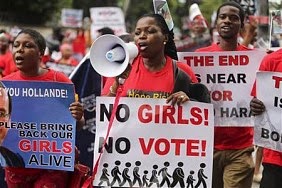MAIDUGURI, MAY 15 -
Nigeria's president has rejected an offer from Islamist rebel group
Boko Haram to exchange schoolgirls it abducted for imprisoned militants,
but the government is open to broader talks with the rebels, a visiting
British minister said.
President Goodluck Jonathan is under pressure to crush the rebels who
have killed thousands in their campaign for an Islamist state and to
free the girls whose abduction a month ago has sparked global outrage.
Government officials initially said they were exploring all options
with respect to the swap proposal and later said they were willing to
negotiate with Boko Haram without specifying whether any putative talks
might include an exchange for the girls.
Jonathan further refined that position on Wednesday during talks with Britain's Minister for Africa Mark Simmonds.
"He (Jonathan) made it very clear that there would be no negotiations
with Boko Haram that involved a swap of abducted schoolgirls for
prisoners," Simmonds told reporters after meeting Jonathan.
"What he also made very clear to me was that he wanted his government
to continue a dialogue to make sure a solution could be found and that
security and stability could return to northern Nigeria for the medium
and the long term," he added.
Rebels stormed a school in the northeastern village of Chibok a month
ago and seized 276 girls who were taking exams. Some have escaped, but
about 200 remain missing. On Monday, Boko Haram leader Abubakar Shekau
released a video showing some of the girls in captivity and offered the
swap.
The abductions have triggered a social media campaign under the Twitter
hashtag #BringBackOurGirls and the United States, Britain, France and
Israel have offered help or sent experts to Nigeria to assist the
effort.
Britain has offered a Sentinel surveillance plane, a team embedded at
Nigerian military headquarters, a team embedded with international
groups analyzing intelligence from the hunt and more funding for a Safe
Schools Initiative, Simmonds said.
"The offer has been accepted by President Jonathan ... so we are
working on the detail of that and how we might facilitate a quick
implementation," Simmonds said.
SHOTS FIRED
Boko Haram killed at least four soldiers in an ambush on Tuesday near
the village where the girls were abducted. The clash highlights the
obstacles facing an international hunt for the girls that is gathering
pace as well as the willingness of the rebels to confront the Nigerian
army.
The soldiers were killed in a night ambush outside the northeastern
city of Maiduguri and several insurgents also died in the firefight,
according to a statement on Wednesday from Defence Headquarters.
"Troops on patrol around Chibok were ambushed by insurgents yesterday.
Troops engaged the insurgents in a fierce combat and extricated
themselves from the ambush killing several insurgents. Four soldiers,
however, lost their lives during the ambush," said a statement from
Defence Headquarters.
"On evacuation of the remains of the fallen troops, the General Officer
Commanding addressed the troops who registered their anger about the
incident by firing into the air. The situation has since been brought
under control," it said.
Soldiers interviewed by Reuters said the ambush happened after a
commanding officer instructed his unit to return to Maiduguri in the
evening, something the troops were unwilling to do on the grounds it
might expose them to attack.
In interviews, they gave differing numbers of those killed, but all
exceeded the four stated by Defence Headquarters. One account said six
died while another said 12 had been killed.
Publicity over the abductions has cast a harsh spotlight on Nigerian
military efforts to secure the girls' release and quash the insurgency
and also opened an avenue for diplomatic and security cooperation.
France is due to hold a security summit in Paris on Saturday with
Jonathan, leaders from neighbors Benin, Cameroon, Chad and Niger and
other African countries, as well as representatives from the United
States and Britain.
Jonathan said he welcomed the summit, which will discuss how to
intensify collaboration against Boko Haram and other radical groups.
"If we all collaborate more, it will easier to eradicate Boko Haram and terrorism," he said in a statement.
Defence chiefs from the Economic Community of West African States also
met in the Ghanaian capital Accra on Wednesday to discuss regional
action on Boko Haram.







No comments:
Post a Comment